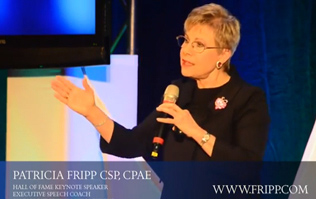
Some presenters like to move, while others stand still. At the beginning of any presentation you should stand still. Your audience members are getting used to you, how you sound, how you speak – how fast, your cadence, or your accent.
As you continue your presentation, make sure your movement supports your message. Avoid unconscious expressions of nervous energy. Have you noticed that some speakers look as though they are doing a little dance? Do not distract your audience with unnecessary movement.
Exceptional speakers employ three types of movement:
- On purpose. When you are moving and it is very obvious to the audience that you intended to move.
- On transition. You move between one thought and the next. One of my client’s transitional lines was “Fast forward seven years.” That was when he would move from one talking point to the other. If you have three or four talking points, feel free to move between each one. And while you are moving, you can use the phrase “And the second strategy is…” and “And the third strategy is…” etc.
- On a movement-specific line. You move to act out your words, such as “As I walked into your corporate office…”
“What Do You Do Just Before Your Presentation? – FrippVT Video,” “Stand Still – The Interesting Truth about Movement,” “Public Speaking – Delivery Strategy,” “Is Your Audience Hearing What You Want to Communicate?” and “Physical Preparation for Successful Public Speaking” are just a few of the many complimentary resources on Fripp.com to help you with your delivery.
![]() If you want to become a great speaker easily, conveniently, and quickly, FrippVT can help. Enjoy a free trial: http://frippvt.com
If you want to become a great speaker easily, conveniently, and quickly, FrippVT can help. Enjoy a free trial: http://frippvt.com
“I highly recommend FrippVT to everyone who speaks in public or has to. It just doesn’t make sense to be without 24/7 access to the wisdom and experience of the master professional that Patricia Fripp is.”
– Pat Lynch, President, Business Alignment Strategies
Executive Speech Coach and Hall of Fame Keynote Speaker Patricia Fripp works with individuals and companies who realize that powerful, persuasive presentation skills give them a competitive edge

Nice timely tip for me, Patricia, thank you.
My current presentation (yet another WW2 story, this time with a naval slant) requires several ‘fast forwards’ and even a couple of ‘fast backwards’ … something wrong here?
I’ll rehearse with matching body language, as you advise – but it looks like I’m going to be a moving target, just like my Dad’s bomber was in 1942.